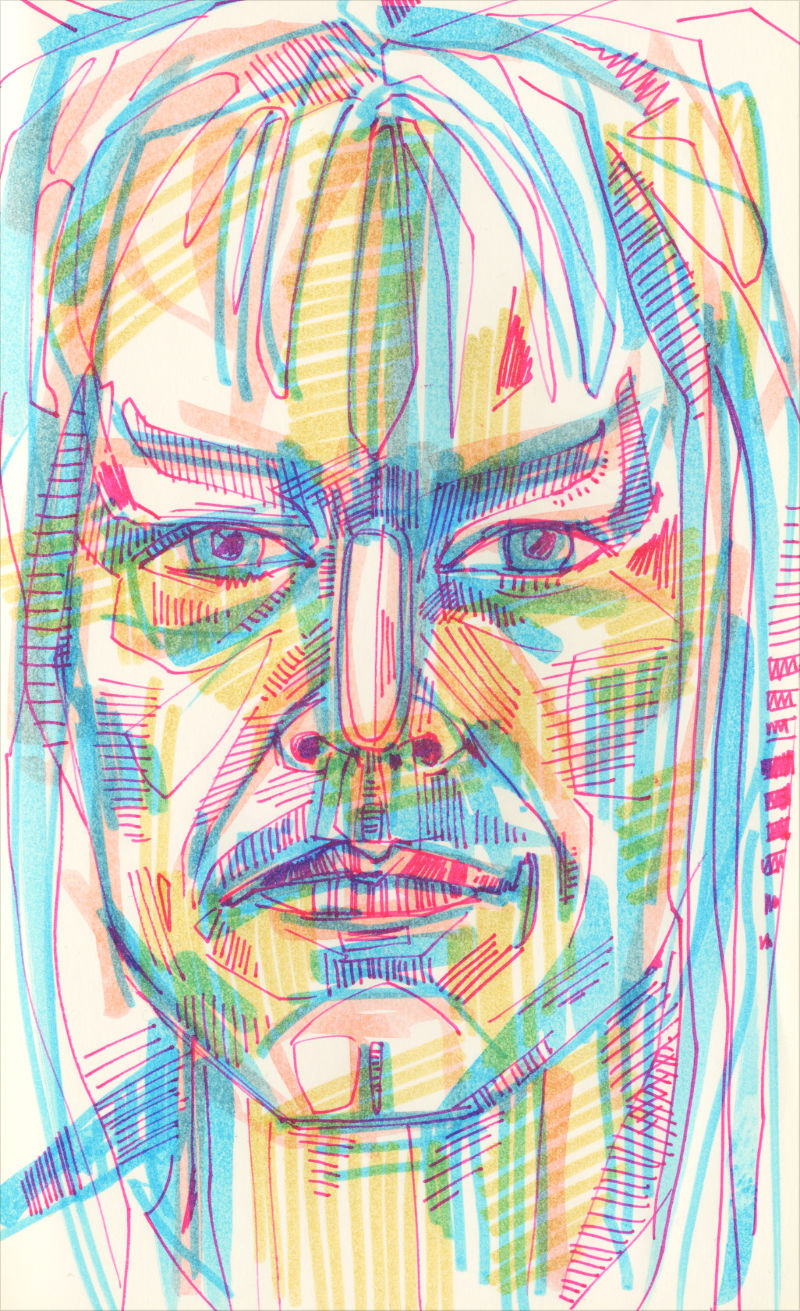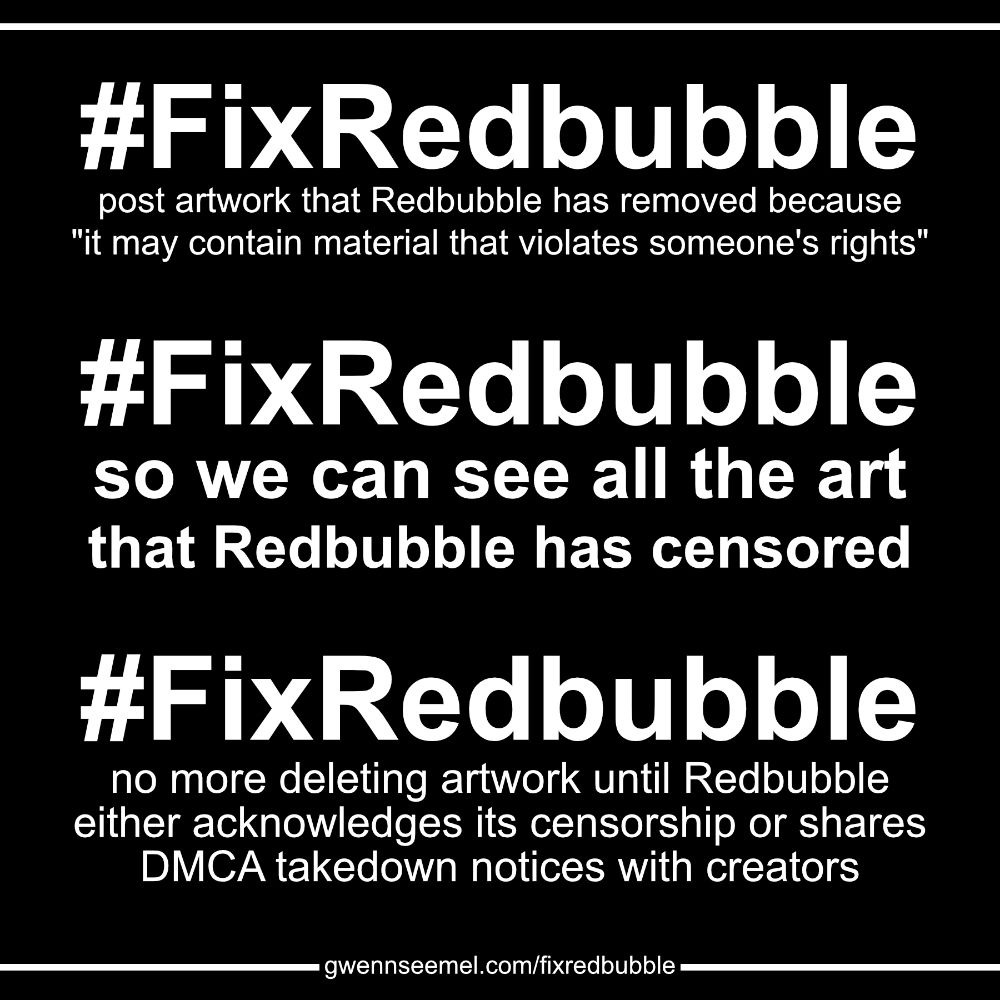Blog / 2019 / Name That Copyright Violation: Celebrity Portraiture Edition
June 7, 2019

Here we go again! When we first played the “Name That Copyright Violation” game a few days ago, I showed you some artwork that Redbubble had censored and invited you to guess whose rights the images supposedly infringe on.
At first glance, today’s version of the game probably seems ridiculously easy. You might be thinking: “Celebrity portraits? Well of course the subjects get to decide how their faces are used!”
But the truth is a bit more complicated than that, and, more importantly, this edition of the game leads us to a deeper level with Redbubble—one where we get to see the company’s soft underbelly.

Before we get started, the referee wants to make a point of order (or something): we can’t really “Name That Copyright Violation” because celebrity portraits aren’t usually copyright violations.
Copyright allows a creator to control the expression of an idea, but the idea itself can’t ever be copyrighted. Since a face is the idea from which the portraits stem, you can copyright individual portraits like Luzdy’s above, but you cannot copyright the face that inspired it.
The only way copyright might provide control over a celebrity portrait is if the portrait were photorealistic and obviously referencing a specific picture of the star. In that case, the photographer (or the institution that owns the photographer’s copyright) might have a copyright claim. Otherwise, the concept of intellectual property is out.

Instead, when making and selling images of a famous person, it’s the right of publicity that complicates things. This right basically allows a celebrity to sue to have their face removed from ads or merchandise. It is protected in some states in the US as well as in some countries but not everywhere, and it extends after death in some places but not others. That’s important because, if you look at how the law is enforced in the US, it appears to matter where the celebrity died. If postmortem rights don’t exist where they passed away, then the artist’s estate probably does not have a right to control their likeness after death.
All that said, in the US, you can use a celebrity’s likeness without permission and make money from it if your use is protected by the First Amendment. You may have to defend that use in court if you get sued, but freedom of speech is a valued right and good defense.
An image like the one above by Sandra Capdelaine—an image that is not a simple likeness, but that includes elements of commentary—is something that the law probably protects.

But what about this portrait of Anne Frank by Marie-Armelle Borel? In this case it’s useful to look at Redbubble’s explanation for the deletion:
Recently we reviewed our guidelines around works that deal with catastrophic events such as the Holocaust and have made the decision to tighten our restrictions. This doesn’t necessarily mean that every work related to this topic will be removed, but some works that have previously been allowable on Redbubble will no longer be acceptable.
In other words, Redbubble is saying that this censorship isn’t about copyright or a postmortem right of publicity. But, when you look at Marie-Armelle’s work, this explanation falls apart. Her depiction of Frank is clearly respectful.
If Redbubble had an appeal process or if the company responded to creators’ emails about deletions with anything more than a form letter, we might forgive this kind of error. But Redbubble refuses to communicate with creators.

David Bowie
2016
marker on paper
9 x 6 inches
Which brings us to the company’s tender bits: the way Redbubble reveals its vulnerability. I’m talking about how, when artists upload work to the site, we are required to check a box confirming that we have the right to sell products with our artwork—including whatever imagery we have incorporated into it. Redbubble’s site software literally stops us from publishing art to the site unless we click to confirm that we are in charge of ourselves.
But, if we are responsible, then why does Redbubble censor our art at all? Why doesn’t the company forward all legal correspondence about our art directly to us? The answer, I suspect, is something that doesn’t seem to make sense when you first hear it:
Rights holders don’t actually care that much about celebrity portraits made by independent artists.
Licensing companies and dead celebrities’ foundations love the idea of having control over marketplaces like Redbubble, specifically because it allows them to supress lots of independent creativity all at once. If we weren’t on Redbubble, they probably wouldn’t do the work of coming after us individually, but the print-on-demand company gives them a nice big target. They have probably threatened Redbubble with enough lawsuits that it has decided to police its own site.
This is super convenient for licensing companies and dead celebrities’ foundations. It saves them time and money, but, more importantly, it insulates them from negative press. After all, can you imagine if the Anne Frank Foundation were going around sending threatening letters to independent artists? The resulting PR nightmare wouldn’t be worth the control they might exert.

Redbubble is in a real bind, but the answer isn’t to side with the bullies. The company needs to partner with the creators who form the basis of its business.
The more images and stories that #FixRedbubble unearths, the more we see Redbubble for what it is—soft underbelly and all. The company may not have the courage to say NO to wealthy rights holders who have no respect for creativity, but artists do. And we can help Redbubble stand up to them.
UPDATE
November 14, 2019
Since publishing this article, I have learned more about how Frida Kahlo’s imagery is being controlled. This article describes that sad mess in greater detail.
UPDATE
November 12, 2020
Since trying to launch the #FixRedbubble campaign, I have deleted my Facebook and Instagram accounts, meaning that much of the content may have disappeared.
Maybe this post made you think of something you want to share with me? Or perhaps you have a question about my art? I’d love to hear from you!
To receive an email every time I publish a new article or video, sign up for my special mailing list.
If you enjoyed this post, Ko-fi allows you to donate. Every dollar you give is worth a bajillion to me!



